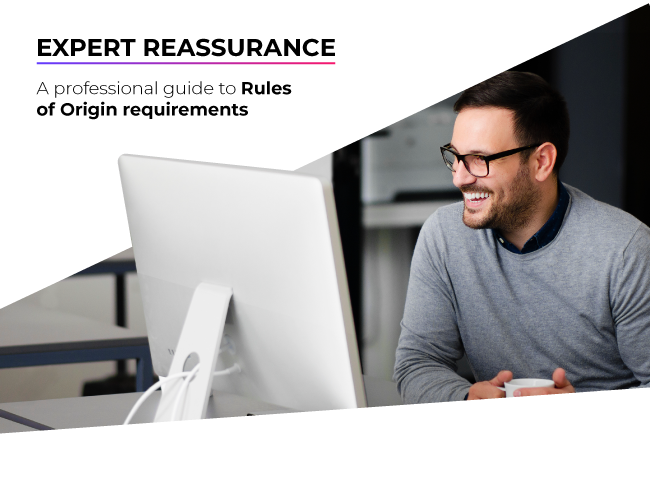Rules of Origin and tariff-free trade
Companies trading between the UK and the EU can often avoid paying customs duties on imports. In order to do so, they need to comply with rules of origin criteria.

Companies trading between the UK and the EU can often avoid paying customs duties on imports. In order to do so, they need to comply with rules of origin criteria.
By now, you’ve likely heard about RoO requirements. You probably also heard that they can be very complex. But what exactly makes proving RoO so complicated, and how can experts help?
The UK’s HMRC has recently updated its Rules of Origin guidance. A brief overview of the guidance gives a sense of what is involved.
Note, though, that the rules are too detailed to be thoroughly dealt with here. However, we will aim to provide a broad sense of the variables involved.
Why do Rules of Origin matter?
Firstly, what are Rules of Origin? Simply put, they specify where a product is made.
Secondly, why does it matter where products are made? In terms of UK-EU trade, RoO is important because the EU-UK Trade and Cooperation Agreement allows for tariff-free trade, providing RoO conditions are met. The specific criteria are detailed in the agreement.
Product specific rules
What does it mean for a product to ‘originate from’ a specified place? In terms of the rules, it depends on the product in question.
For example, in some cases a product must be made from UK or EU materials. As an example, HMRC’s guidance suggests meat produced from an animal born, raised and slaughtered in the UK. The resulting meat product would comply with the originating criteria.
When tariff codes matter
Let’s consider another example.
In other cases, the product-specific rules specify that the Rule of Change of Tariff Heading (or Subheading) applies. In such cases, RoO becomes very bureaucratic and technical. The criteria are determined by the HS codes of the World Customs Organization.
In an example given in the HMRC guide, sunflower seed oil (HS code 151219) made from imported crude sunflower oil (HS 152111O) meets RoO criteria because the tariff code subheading has changed.
If that sounds dry and technical, it’s because it is. To make things more complicated, these rules only apply to some products and not others.
When professional advice is required
The codes governing trade involve thickets of regulations and sub-regulations, with just about as many exceptions as there are rules. To non-experts, these rules, understandably, seem intimidating and confusing.
However, the rules were designed to facilitate trade, not hinder it. For example, the Harmonised System codes of the WCO were created to create a universal, efficient system of trade.
For industry professionals, mastering the codes and regulations is fundamental to the job.
Experts can help you gain full clarity on whether your goods meet the rules of origin criteria. No less importantly, with expert guidance, you will be able to demonstrate when RoO has been met, and secure tariff-free trade.
A holistic supply chain solution
Brexit means paperwork and red tape. The bureaucratic demands can be simply too complex for non-experts. And worse, they are a distraction from your core business. VAT IT created re:TRADE to provide an end-to-end trade solution that manages the red tape for you.
re:TRADE, powered by VAT IT, will ensure full compliance at every stage of the shipping process and manage all customs, tariffs and import VAT requirements. As European VAT specialists, we will reclaim your import VAT and provide clarity and expert guidance.
Related blogs
VAT refund Tool kit
Contact Us
Come explore your refund possibilities.
Chat with us today.
Find out how you could turn company spend into income




